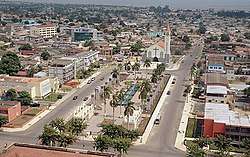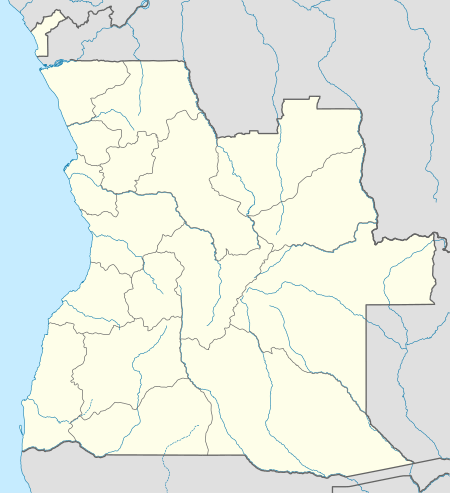Cabinda (city)
Cabinda (Kongo: Tsiowa), formerly Vila Amélia, is a city and a municipality located in the Cabinda Province, an exclave of Angola. Angolan sovereignty over Cabinda is disputed by the secessionist Republic of Cabinda. The city of Cabinda had a population of 550,000[2] and the municipality a population of 624,646, at the 2014 Census. The residents of the city are known as Cabindas or Fiotes. Cabinda, due to its proximity to rich oil reserves, serves as one of Angola's main oil ports.[3][4]
Cabinda Tchiowa Cidade de Cabinda | |
|---|---|
Municipality and city | |
 The Chapel of Rainha do Mundo in the City of Cabinda | |
Seal | |
 Cabinda Location in Angola | |
| Coordinates: 5°33′36″S 12°11′24″E | |
| Country | |
| Admin. division | Cabinda province |
| Founded | 1883 |
| City Status | 1956 |
| Area | |
| • Total | 2,273 km2 (878 sq mi) |
| Elevation | 24 m (79 ft) |
| Population (mid 2019)[1] | |
| • Total | 718,915 |
| • Density | 320/km2 (820/sq mi) |
| Climate | Aw |
History
The city was founded by the Portuguese in 1883 after the signing of the Treaty of Simulambuco, in the same period as the Berlin Conference.
There are considerable offshore oil reserves nearby.
Geography
Cabinda is located on the Atlantic Ocean coast in the south of Cabinda Province, and sits on the right bank of the Bele River.[3] It is 56 kilometres (35 mi) north of Moanda (DR Congo), 70 kilometres (43 mi) north of Congo River estuary and 137 kilometres (85 mi) south of Pointe-Noire (Rep. Congo).[5]
Districts
The city of Cabinda is divided into three districts, or comuna:
- Cabinda, the city seat, with 88.6% of the population the city
- Malembo, with 3.1%
- Tando-Zinze, with 8.3%[6]
Education
Universities:
- Universidade 11 de Novembro
- Universidade Lusíada
- Private University of Angola
- Instituto Superior de Ciências da Educação de Cabinda
Culture
The city's population has a peculiar culture from its way of dressing and eating to traditional rituals, especially Chicumbe and celebrated ceremonies of Bakamas do Tchizo,[7] a traditional ritual that enables the interaction between the living and the occult spirits of the gods and the ancestors, thus ensuring the reconciliation between the dead and the living.[8]
Language
Ibinda, a Bantu language, is the primary language of both the city and province of Cabinda.[4] Portuguese, the official language of Angola, is also spoken, though mostly as an administrative role. Since Cabinda was colonized relatively later (late nineteenth century) by Portugal compared to most of Angola, Portuguese isn't as widely spoken, though language speakers are rapidly growing in number.
Transport
In 2012, a proposed railway connection to the main Angolan system has to cross territory of the Democratic Republic of the Congo.
See also
- Togolese national football team bus attack
References
- Citypopulation.de Population of provinces and municipalities in Angola
- Citypopulation.de Population of the major cities in Angola
- "Cabinda". Encyclopædia Britannica. Encyclopædia Britannica Inc. 2014. Retrieved 2014-06-21.
- "Cabinda" (in Portuguese). Luanda, Angola: Info-Angola. 2014. Archived from the original on 2015-11-25. Retrieved 2014-05-21.
- Google. "Cabinda (city)" (Map). Google Maps. Google.
- "Region 1: Cabinda". Postcode Query. 2014. Retrieved 2014-06-21.
- "Cidade de Cabinda comemora 52 anos" [Cabinda city celebrates 52 years] (in Portuguese). Governo da Província de Cabinda. Retrieved 2019-03-19.
- "Uma excursão virtual a Cabinda" [A virtual tour to Cabinda] (in Portuguese). Teia Portuguesa. Archived from the original on 2008-07-25. Retrieved 2019-03-19.
Bibliography
External links
| Wikisource has the text of the 1905 New International Encyclopedia article Cabinda. |
- Profile of Cabinda Municipality (in Portuguese)
